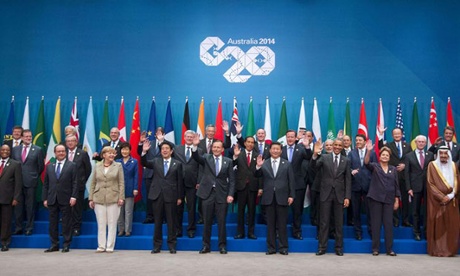US president pulls focus away from economic growth with announcement of emissions deal with China and call to secure a strong global climate agreement next year

Climate change was forced to the top of the G20 agenda on Saturday, despite the objections of the host nation Australia, after Barack Obama urged the world to rally behind a new global agreement and the United Nations secretary general, Ban Ki-moon, called it “the defining issue of our times”.
The Australian prime minister, Tony Abbott, had argued climate discussions would distract from the G20’s economic policy focus and should be left to other UN-led meetings.
But in a one-two manoeuvre that caught Australia off guard, Obama upstaged Abbott and made certain it was the talk of the conference anyway. First came the joint US/China post-2020 greenhouse emission reduction targets announced in Beijing on the eve of the summit and then the $3bn Green Climate Fund pledge made in a keynote speech as Abbott was greeting other world leaders across town.
“No nation is immune and every nation has a responsibility to do its part,” Obama said. “You will recall at the beginning I said the US and Australia has a lot in common. Well one of the things we have in common is we produce a lot of carbon … which means we’ve got to step up.”
He said the targets he announced with the Chinese president, Xi Jinping, sent “a powerful message to the world that all countries, whether you are a developed country, a developing country or somewhere in between, you’ve got to be able to overcome old divides, look squarely at the science and reach a strong global climate agreement next year”.
“And if China and the US can agree on this then the world can agree on this, we can get this done and it is necessary for us to get it done.”
But in the backrooms of the G20, Australia was continuing to resist language in the official communique encouraging countries to make pledges to the Green Climate Fund, prompting environmental and aid groups to warn the host nation was appearing like a “blocker”.
Abbott has been highly critical of the fund. When asked about it before last year’s UN climate meeting in Warsaw, he said: “We’re not going to be making any contributions to that.” It was reported that at one of its first cabinet meetings the Abbott government decided it would make no contributions to it, and that it was described as “socialism masquerading as environmentalism”.
And Australia and Canada pointedly dissented from support for the fund in a communique from last November’s Commonwealth Heads of Government meeting.
Abbott was also attacked for focusing on his own domestic agenda as he welcomed the world leaders to a G20 “retreat” on Saturday morning.
Instead of focusing on world crises such as stagnating growth, the Ebola epidemic or conflicts, Abbott cited his difficulties in legislating for a new fee for when Australians go to the doctor and a plan to deregulate the higher education sector.
Abbott “thanked God” he had stopped the “illegal boats” – carrying asylum seekers – and had successfully repealed the carbon tax, but complained it was proving “massively difficult” to pass his budget cuts. The opposition leader, Bill Shorten, described the address as “weird and graceless”.
But in the formal negotiating sessions, world leaders were talking about the things Australia wanted on the agenda: a Brisbane action plan in which G20 nations will promise to implement new policies that have been assessed to have the potential to add 2% to their collective economic growth, and an infrastructure hub to be located in Sydney promote investment.
Before the meeting only Australia had committed money to this idea, but officials said the UK, New Zealand, Korea, Singapore and Saudi Arabia had now promised an unspecified amount.
Obama also used his address to reassert American military, economic and political influence in the Asia Pacific and the importance of his so-called “pivot” to the region.
The president said the US would work “day in, day out, steadily and deliberately” to deepen its military, economic and diplomatic engagement – saying that by the end of the decade most of the US navy and air force would be based in the Pacific because “the United States is and always will be a Pacific power”.
Anticipated protests outside the meeting were largely peaceful and resulted in only a handful of arrests. Police outnumbered protesters.
The world leaders were treated to an Australian barbecue lunch, cocktail reception and concert by local musicians on Saturday night. Their spouses visited a local koala sanctuary on Saturday afternoon.
